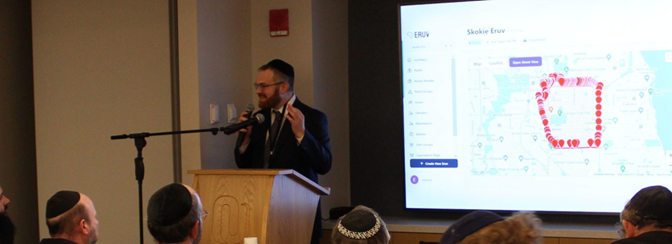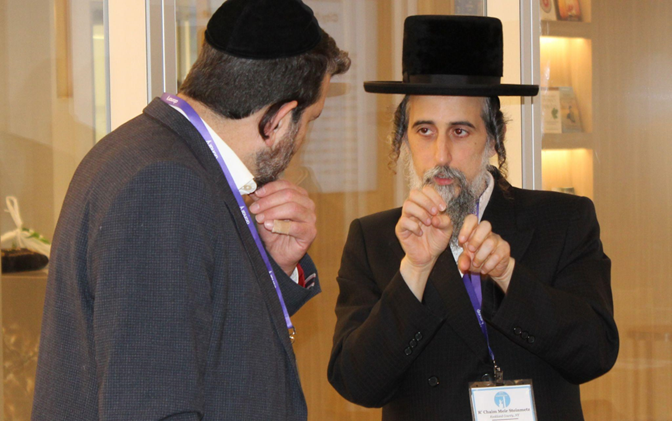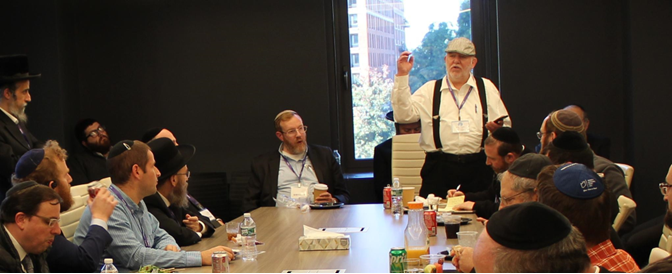Event offered chizuk and opportunities to network and learn about technological advancements
 Eruv professionals at the first-ever City Eruv Conference at OU headquarters in New York
Eruv professionals at the first-ever City Eruv Conference at OU headquarters in New York
Carrying objects and pushing a stroller or wheelchair on Shabbos are abilities many frum Jews take for granted. While the community values the conveniences afforded by eruvin, the complex halachos and physical work involved in erecting and maintaining them are rarely considered.
“There’s a common misconception that eruvin are easy to construct, and that they’re good for 25 years,” says OU Director of Halacha Initiatives Rabbi Ezra Sarna. “People don’t appreciate how hard it is to build an eruv properly and the effort needed to maintain it from week to week. The conference created awareness of the scope involved in city eruvin and the special people that take care of them.”
The two-day event, organized by Rabbi Sarna and the National Eruv Initiative’s Rabbi Baruch Gore, drew over 60 eruv professionals across the religious spectrum from 35 cities in 10 states including California, Oregon, Illinois, Ohio, and Michigan, as well as Canada.
“The achdus of the diverse group infused every minute with a unique and powerful energy,” says Rabbi Gore. “It was inspiring to see everyone’s shared focus on enhancing shmiras Shabbos both in their hometowns and in other communities. Each attendee walked away with knowledge, resources, and inspiration to fulfill their numerous eruv responsibilities with a renewed passion for helping Klal Yisrael.”
Participants heard from leading poskim, learned about new technological advancements in the field, and gained insights from others on how to approach the difficult tasks that are involved with maintaining a city eruv in modern times. The conference also marked the unveiling of the OU’s new, free software developed for eruv administrators. The software takes thorough inventory of all of the components and details of a community eruv, and tracks issues and repairs in real time, enabling the entire eruv maintenance team to communicate quickly and effectively.
“The OU admires these professionals and their work, and we want to support them,” says Rabbi Sarna, who sought their feedback as the software was being developed. “The conference committee, which comprised renowned eruv builder Rabbi Micah Shotkin of Passaic, New Jersey, and Rabbi Chaim Meir Steinmetz, eruv supervisor of multiple tri-state area eruvin including Monsey, and son of Dayan Rabbi Yechiel Steinmetz, encouraged Rabbi Gore and me to create the conference. Until now, there was no network or sharing of ideas and experiences. The OU was equally excited to provide the space for everyone to congregate and connect in person. Hosting the conference in the OU’s Manhattan headquarters sent a strong message to the attendees that their work is of national importance.”
 OU Director of Halacha Initiatives Rabbi Ezra Sarna showcases the new eruv software developed by the OU
OU Director of Halacha Initiatives Rabbi Ezra Sarna showcases the new eruv software developed by the OU
Eruv poskim are experts in Hilchos Eruvin who assess the feasibility of building community eruvin. They work with eruv builders and supervisors who construct, oversee, and maintain an eruv’s myriad points and installations.
“The people filling these roles are generally their own islands,” says Rabbi Sarna. “Many people don’t know they exist, but they invest either their whole lives, or significant hours, ensuring that the eruv is operational. As the Jewish community continues to grow, we will need more and more of these inspiring professionals.”
Following opening addresses from OU Kosher Chief Operating Officer Rabbi Moshe Elefant and Yeshiva University Rosh Yeshiva and OU Kosher Posek Rabbi Hershel Schachter, participants enjoyed sessions on varied topics including eruv materials and tools, an electrical wire safety presentation and a shiur from Monroe Posek Rabbi Yoel Cohen. The conference closed with a focus on “Setting city eruvin up for success”, led by Eruv Network Founder Rabbi Shlomo Francis, author of The Laws of An Eruv. Rabbi Gore delivered a session on “Creating a positive eruv culture”, and attendees also heard from attorneys David Yalkut and Yehuda Buchweitz, who have represented many communities in high-profile eruv cases in court.
“On a weekly basis I see the mesiras nefesh of my eruv checkers who are constantly giving their time and efforts,” says Rabbi Chaim Yadlovker of Edison, New Jersey, an eruv builder and supervisor for communities in Great Neck, New York as well as Union Township and Linden, New Jersey. “But at the conference, we saw the mesiras nefesh of people who aren’t part of the core eruv team. These lawyers work pro bono and dedicate so much of themselves to this cause. Their presentations were unbelievable. They reiterated that they are always there for us, and it gave me chizuk and meant a lot to me.”
The conference also featured a halachic Q & A session with Posek and Rosh Kollel of Yeshivas Siach Chaim of Great Neck Rabbi Isaac Kresch, and a roundtable discussion over lunch that enabled participants to share insights and experiences and learn from one another, something Rabbi Yadlovker really valued.
“Everyone was so happy to share their ideas,” he says. “It was great to network with other eruv builders and learn how they have dealt with the issues that we all contend with.”
 L-R: Bayswater, New York eruv supervisor Moshe Tusk in conversation with Rabbi Chaim Meir Steinmetz, committee member and eruv supervisor from Monsey, New York
L-R: Bayswater, New York eruv supervisor Moshe Tusk in conversation with Rabbi Chaim Meir Steinmetz, committee member and eruv supervisor from Monsey, New York
Rabbi Michael Alt of Columbus Ohio, agrees. As his community’s eruv manager, Alt’s roles include checking, repairing, fundraising for the eruv, submitting shaylos to their posek, and running board meetings.
“I came away with many valuable ideas from the collective experiences and knowledge of the group,” he says. “It was very meaningful to learn about the initiatives dedicated to creating a national network of support for community eruvin. The collaboration enabled by this conference is a tremendous achievement.”
The conference’s corporate sponsor, Donary, a chassidic-owned donor relations management company that creates smart fundraising solutions for nonprofits, was proud to be able to contribute to the cause. Donary canvassed participants about prospective technologies the company could create that would facilitate eruv-related responsibilities, as well as presented their current products and services.
Rabbi Shaya Winiarz is the Rav of Congregation Beis Hillel, which borders Union Township and Elizabeth, New Jersey. He was thrilled by Rabbi Sarna’s session on the OU’s new eruv software.
“Hashem gave us technology to utilize it,” he said. “Documenting our eruvin in great detail online is a fantastic step toward establishing high standards for the future of Klal Yisrael’s shemiras Shabbos.”
Rabbi Winiarz is grateful to the conference organizers and the OU for creating a network of dozens of colleagues, whom he now calls friends.
“I’m no longer working by myself,” he says. “I can now call on others who know so much about their area of eruv expertise. Rabbi Micah Shotkin, for example, shared that he has spent decades of trial and error to determine what works, and he has offered to guide us and point us in the right direction.”
Dov Coodin of Ottawa, Ontario has been building and supervising eruvin in Ottawa and Toronto for almost 30 years. He also commended the organizers for running this unprecedented event.
“To the eruv professionals and the OU who have organized this, your reward in shamayim is going to be tremendous because of the work you’ve done. There will be enormous growth in the eruv field because of your leadership. Thank you so much.”
 Dov Coodin, an eruv builder from Ottawa, Canada, shares tips at the Round Table Discussion
Dov Coodin, an eruv builder from Ottawa, Canada, shares tips at the Round Table Discussion
Rabbi Shotkin adds that were it not for the OU, the conference would never have been such a success.
“I have already seen practical results come from the far-reaching networking that we achieved,” he says. “The OU is a Klal Yisroel organization that benefits Jews everywhere. It was with their overarching leadership and acceptance that we were able to reach and connect with people across the spectrum of the Jewish world.”

Here in Lakewood, we could use:
a) A set of Eruv maps
b) Knowledge of who built, approved, and who checks each eruv.
c) Phone # to call on Erev Shabbos to ensure that it’s kosher for that week
d) Information as to whether the eruv encompasses just regular streets or bigger streets, such as Cross street, East Veterans Highway…
e) As a bonus- someone to take down eruv poles which are no longer part of an eruv. It is very confusing for someone to check whether it’s okay to carry, and then see a bent pole, or a sagging or ripped string and know whether it’s an ancient relic, or an important component of the eruv.
One Shabbos morning I was walking to Shul with a potential Ger.
We were discussing how a Non-Jew can’t keep Shabbos.
He said, “I know. That’s why I’m carrying a key in my pocket.”
I told him, “But there’s an Eruv.”
He replied, “I know, but I don’t hold by it.”
I told the Ruv in charge of Geirus that this man is more than ready to be a Yid.